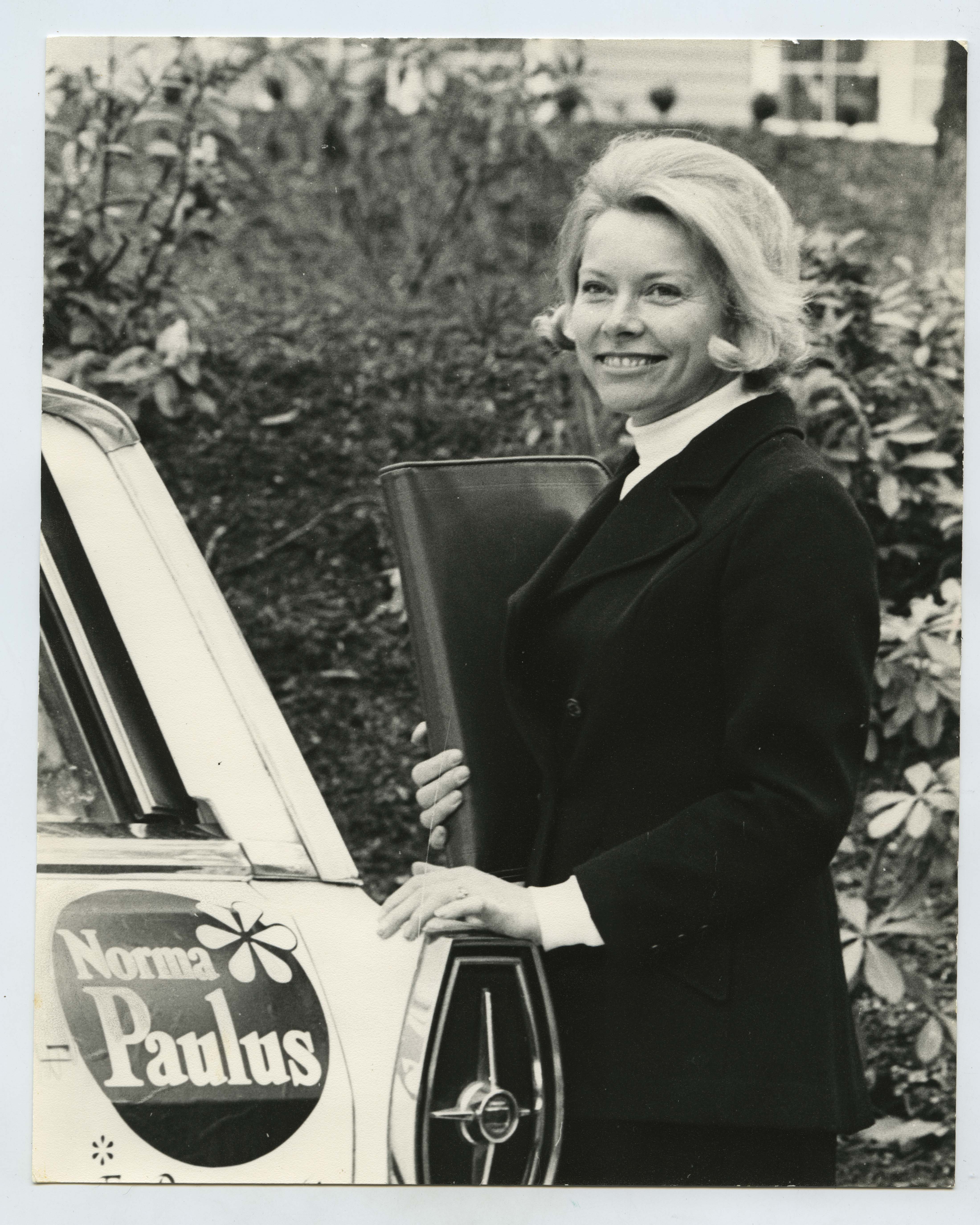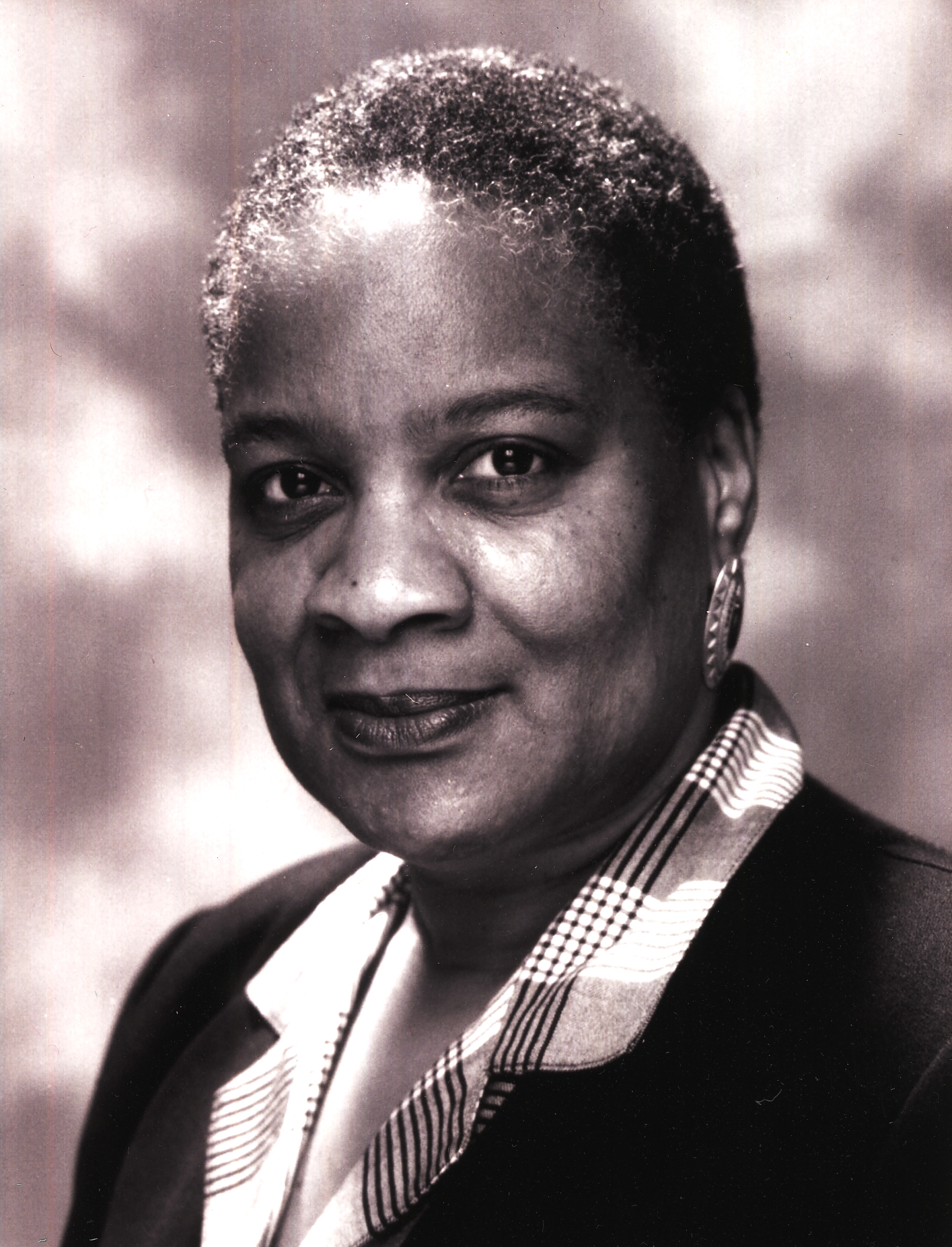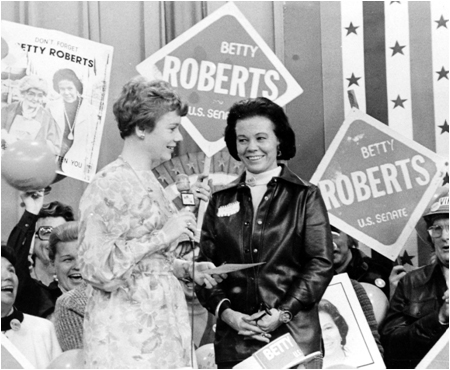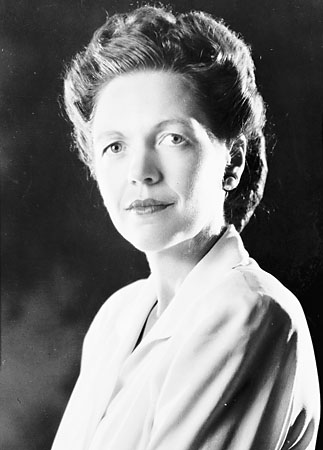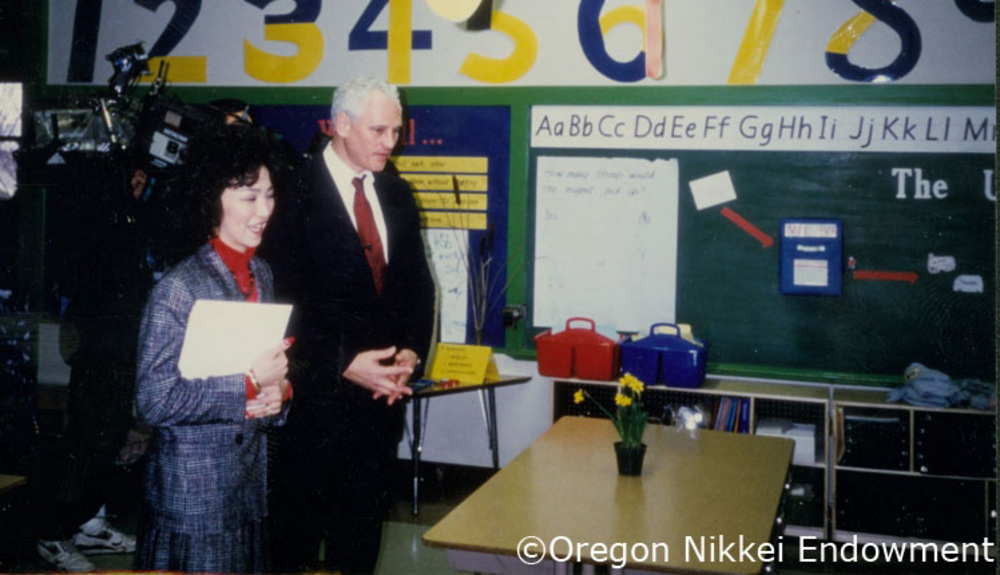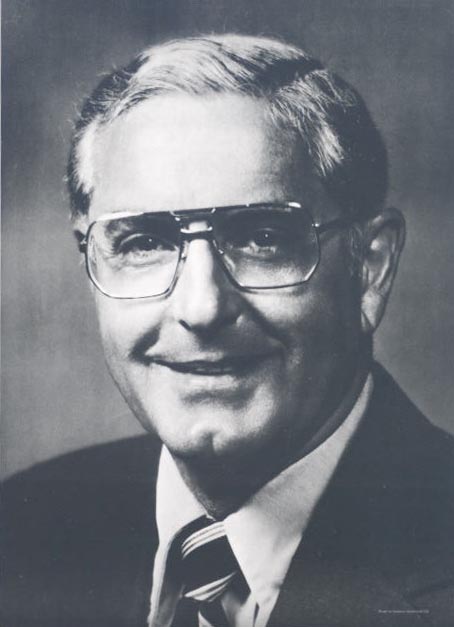Norma Paulus was a forward-thinking, practical-minded Republican leader whose efforts to advance women’s rights, environmental protection, public education, and governmental transparency helped cement Oregon’s progressive reputation from the 1970s through the early 2000s. The first woman to be elected to statewide office in Oregon, she was also one of a cohort of women, both Republicans and Democrats, who supported one another and opened the way for a younger generation of women to follow.
Norma Petersen Paulus was born on March 13, 1933, in Belgrade, Nebraska, the fourth of seven children of Paul and Ella Petersen. The family moved to Oregon in 1936, settling first in Eugene and then on a homestead near Burns, where Paul Petersen prospected for oil. They moved to Burns a few years later and weathered the Depression about as well as anyone did, as Norma’s father drilled water wells and her older brother Harold set pins at a bowling alley.
An exceptional student, Norma Petersen was editor of the high school newspaper and the yearbook, a gymnast, and a drum majorette. College was financially out of reach for her, however, and she took a job as secretary for Leland Duncan, Harney County district attorney. Two years later, she contracted polio, which meant being hospitalized in Portland and spending months of recovery at home.
In her early twenties, she moved to Salem, where she was hired as secretary for attorney Brian Goodenough and, a few years later, as secretary for Earl Latourette, chief justice of the Oregon Supreme Court. Latourette helped her apply to Willamette University School of Law using a law that enabled people, especially veterans whose education had been disrupted, to attend college by taking one or more challenge exams. Petersen passed the exams and enrolled in Willamette Law School in March 1957. She married fellow student William G. Paulus in 1958 and graduated with honors in 1962, passing the bar exam the same year. The couple had two children.
Paulus campaigned for law school classmate Wallace P. Carson in 1964 in his successful run for the Oregon House of Representatives, an experience that sharpened her interest in politics. She was exposed to the grassroots campaign strategies used by Republican strategist Robert Packwood, who told her that “the biggest asset in his career was that he tapped into the resource of well-educated women when nobody else was doing that.” In 1970, Paulus ran successfully as a Republican for Marion County District 4. She gained respect as an effective bipartisan legislator who joined with colleagues to pass significant legislation, including the Bottle Bill, and was reelected in 1972 and 1974.
During the 1973 legislative session, Paulus joined an energetic, bipartisan group of women that was instrumental in passing laws securing women’s rights. That session had more women legislators than ever before—eight in the House and two in the Senate—and Paulus persuaded Democratic lawmaker Betty Roberts, the senior woman in the legislature, to form a bipartisan, cross-chamber women’s caucus. “We just came alive that session,” Paulus said later. “We made a list of all the women’s issues, and a list as long as your arm of all the statutes that discriminated against women.”
At the top of the women's list was ratification of the Equal Rights Amendment, which came before the U.S. Senate in February 1973. In a February 8 speech, Paulus emphasized the ERA's intent and expressed her practical feminism in a nutshell. “The Equal Rights Amendment seeks to change the government’s attitude toward women," she said. "Today, I don’t care what you men really think of me or what your attitude toward me is, but I do care what the government thinks of me and what its attitude is toward me.” Oregon became the twenty-third state to ratify the ERA.
Also in 1973, as a member of the House Judiciary Committee, she and Democratic legislator Vera Katz helped pass a bill that would allow married women to keep their names and divorced women to change theirs. Paulus and the women’s caucus also got behind a bill to make soliciting of a prostitute illegal, arguing that “if it is against the law to sell it, then it should be against the law to buy it.” The bill passed with a comfortable majority. Paulus supported legislation establishing Oregon’s pioneering land use planning framework and bills that secured tougher safeguards for the environment, acquired lands for state parks, and ensured open public meetings and records. In the 1975 session, she was instrumental in passing legislation to reform inheritance laws that treated widows differently from widowers in assessing inheritance taxes.
Paulus became secretary of state in 1976, the first woman to hold elected statewide office in Oregon. During the eight years she served, she overhauled archiving procedures for state records, tightened processes for audits of state agencies, and oversaw Oregon’s first vote-by-mail election. She also was instrumental in thwarting potential voter fraud in Wasco County after followers of Bhagwan Shree Rajneesh moved there in May 1981.
In a close race in 1986 (42,470 votes out of 1.08 million cast), Paulus lost her campaign for governor to Neil Goldschmidt. Goldschmidt subsequently appointed her to the Northwest Power Planning Council (now the Northwest Power and Conservation Council), which she served on through 1989. As superintendent of public instruction, elected in 1990, she revamped the state’s educational system, emphasizing performance standards and assessment measures. The school-to-work program she put in place received nationwide praise for its effectiveness in forging ties between schools and the business community.
Paulus entered the Republican primary in 1995 to fill Bob Packwood’s U.S. Senate seat and lost to Gordon Smith, a Republican from Pendleton. She continued as superintendent until retiring in early 1999 to care for her husband Bill, who died that March.
Paulus was director of the Oregon Historical Society from 2001 through 2003. She served on the boards of the Oregon State Capitol Foundation, the High Desert Museum, the Oregon Coast Aquarium, and the Oregon Garden. A lifetime trustee of Willamette University, she received honorary doctorates from Willamette University, Whitman College, Lewis & Clark College, and Linfield College, and she received a Distinguished Service Award from the University of Oregon in 2004. The following year she was named Statesmen of the Year by the Oregon Business Association. In 2008, she led a fund-raising drive to commission a statue of Oregon governor Tom McCall for Salem’s Waterfront Park.
Norma Paulus died in Portland on February 28, 2019.
CLICK HERE to listen to an oral history interview with Norma Paulus on OHS Digital Collections.
-
![Norma Paulus’s 1970 legislative campaign.]()
Norma Paulus’s 1970 legislative campaign..
Norma Paulus’s 1970 legislative campaign. Courtesy Paulus family.
-
![]()
Norma Paulus photo for the 2012 Oregon Historical Society History Makers Awards..
Courtesy Vivian Johnson, photographer.
-
![]()
Norma Paulus, 1975.
Courtesy Oregon Hist. Soc. Research Lib., Journal, photo file 849
-
![]()
Norma Paulus.
Courtesy Oregon Hist. Soc. Research Lib., Lot 691, box 1, folder 6
-
![]()
Paulus on election night, 1976.
Courtesy Oregon Hist. Soc. Research Lib., Orhi104779, photo file 849
-
![]()
Norma Paulus being sworn in as Secretary of State by James Burns, 1976.
Courtesy Oregon Hist. Soc. Research Lib., Oregon Journal Coll., photo file 849, Orhi105568
-
![]()
Norma Paulus, 1979.
Courtesy Oregon Hist. Soc. Research Lib., Oregon Journal Coll., photo file 849
-
![]()
Norma Paulus.
Courtesy Oregon Hist. Soc. Research Lib., Lot 691, box 1, folder 6
-
![]()
Paulus and her husband Bill at a campaign event, 1980.
Courtesy Oregon Hist. Soc. Research Lib., Oregon Journal Coll., photo file 849, Orhi104426
-
![]()
Norma Paulus hugs Vic Atiyah after reelection win, 1980.
Courtesy Oregon Hist. Soc. Research Lib., Oregon Journal Coll., photo file 849
-
![]()
Paulus at the re-gilding ceremony of the Oregon Pioneer statue at the Oregon State Capitol, 1984..
Courtesy Paulus family.
-
![]()
Norma Paulus campaigning for governor at the 1986 Pendleton Round-Up parade.
Courtesy Paulus family
-
![]()
Norma Paulus.
Courtesy Oregon Hist. Soc. Research Lib., Lot 691, box 1, folder 6
Related Entries
-
![Avel Gordly (1947-)]()
Avel Gordly (1947-)
In 1996, Avel Louise Gordly became the first African American woman to …
-
![Betty Roberts (1923-2011)]()
Betty Roberts (1923-2011)
Betty Roberts was a thirty-two-year-old housewife with four children wh…
-
![Edith Starrett Green (1910-1987)]()
Edith Starrett Green (1910-1987)
Democrat Edith Starrett Green represented Oregon’s 3rd Congressional Di…
-
![Maurine Neuberger (1906-2000)]()
Maurine Neuberger (1906-2000)
Maurine Brown Neuberger entered politics as an Oregon state legislator …
-
![Mildred Schwab (1917-1999)]()
Mildred Schwab (1917-1999)
A Portland city commissioner for fourteen years, Mildred Schwab was kno…
-
![Neil Goldschmidt (1940-2024)]()
Neil Goldschmidt (1940-2024)
Neil Edward Goldschmidt, the thirty-third governor of Oregon (1986-1991…
-
Rajneeshees
Bhagwan Shree Rajneesh, a spiritual teacher who developed a substantial…
-
![Robert W. Packwood (1932- )]()
Robert W. Packwood (1932- )
Robert William "Bob" Packwood, a prominent United States Senator for tw…
-
![Victor Atiyeh (1923-2014 )]()
Victor Atiyeh (1923-2014 )
Victor George Atiyeh was governor of Oregon from 1979 to 1987. The firs…
Related Historical Records
Map This on the Oregon History WayFinder
The Oregon History Wayfinder is an interactive map that identifies significant places, people, and events in Oregon history.
Further Reading
Bell, George H. “Norma Paulus—Oregon’s Cinderella lawmaker.” Oregon People 1.1 (May 1975).
“The Oregon Legislature: 1971.” Capital Journal, special report July 16, 1971.
Keys, Scott. “A strange but true tale of voter fraud and bioterrorism.” The Atlantic, June 10, 2014.
Paulus, Norma, with Gail Wells and Pat McCord Amacher. The Only Woman in the Room. Corvallis: Oregon State University Press, 2017.
Roberts, Betty, with Gail Wells. With Grit and By Grace: Breaking Trails in Politics and Law. Corvallis: Oregon State University Press, 2008.

